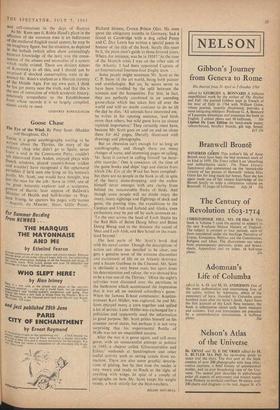Goose Chase
is a great autobiography waiting to be %%mien about the Thirties, the story of the ordinary chap who didn't go to Spain, never loew a soul in the Communist Party, couldn't tell Isherwood from Auden, enjoyed plays with french windows, played country-house cricket and wouldn't have recognised a flat ephemeral pamphlet if he'd seen one lying on his hostess's poulle. Mr. Scott, one would have thought, was Just the man for the job: born in 1909, son of the great Antarctic explorer and a sculptress, gmlson of Barrie, later stepson of Baldwin's Minister of Health and half-brother to Way- land Young, he spatters his pages with 'names --Asquith, du Maurier, Shaw, GuIle Potter,
Richard Strauss, Crown Prince Olav. He even spent the obligatory months in Germany, had a friend at Cambridge with a dog called Pansy and C. Day Lewis has written a special poem in honour of the title of the book. Surely this must be it, the plain man's guide to those fevered years. Where, for instance, was he in 1938? 'At the time of the Munich crisis I was on the other side of the Atlantic. I had been appointed Captain of an International fourteen-foot dinghy team. . .
Some people might nominate Mr. Scott as the C. P. Snow of the art world, being both painter and ornithologist. But no, he seems never to have been troubled by the split between the sciences and the humanities. For him, in fact, they are perfectly .combined in an unending goose-chase which has taken him all over the world and will no doubt continue to do so till the day he dies. 'All animals have interested me,' he writes in his opening sentence, and birds more than others, but wild geese have an almost mystical importance.' They certainly must have, because Mr. Scott goes on and on and on about them for 662 pages, liberally illustrated- with drawings and photographs.
But an obsession isn't enough for so long an autobiography, and though there are many changes of scene, and interesting pages'on sailing, Mr. Scott is correct in calling himself 'an incur- able recorder.' One is conscious all the time of the game books and ships' logs and diaries from which The Eye of the Wind has been compiled: but there are no people in the book at all, in spite of the heavy name-dropping, and the author himself never emerges with any clarity from behind the innumerable flocks of birds. And though some people will no doubt enjoy the many, many sightings and flightings of duck and geese, the punting trips, the expeditions to the Caspian and Utah and Iceland and Alaska, even enthusiasts may be put off by such sentences as: 'To the east acrOss the head of Loch Slapin lay the Red Hills of Beinn Dearg Mhor and Beinn Dearg Bheag and in the distance the sound of Sleat and Loch Alsh, and Ben Scree] on the main- land beyond.'
The best parts of Mr. Scott's book deal with his naval career. Though the descriptions of action are often too detailed to be clear, one gets a genuine sense of the extreme discomfort and excitement of life on an Atlantic destroyer and a Steam Gunboat in the Channel. Mr. Scott is obviously a very brave man, but apart from his determination and valour, the war showed him to be a true son of the Thirties: 'Often the night's activities were discussed over the partitions in the bathroom which accentuated the impression that it was all an outsized schoolboy's game.' When the famous E-boat commander, Kapitan- leutnant Karl Muller, was captured, he and Mr. Scott enjoyed many a yarn together and spilled a lot of secrets; Later M tiller was exchanged for a politician and apparently used the information to good purpose. Mr. Scott prides himself on his amateur naval status, but perhaps it is not very surprising that his experimental flotilla of SGBs was not an unqualified success.
After the war it is geese again, and still more geese, with an unsuccessful attempt at polities in 1945, a chapter called 'Gloucestershire and Ethics,' weekends at Sandringham and other useful activity such as saving canals from ex- tinction. There are also some graphic descrip- tions of gliding, but by that time the reader is very weary and ready to flinch at the sight of anything with wings. In spite of a couple of paragraphs on how Mr. Scott keeps his weight steady, a book strictly for the bird-watchers.
JULIAN MITCHELL


























































 Previous page
Previous page